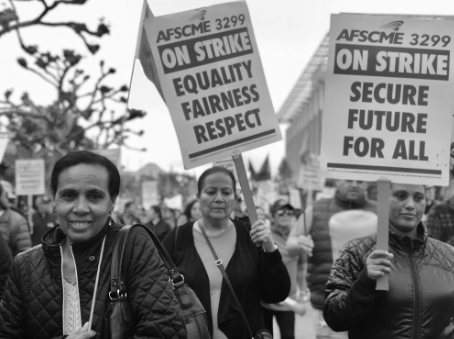Photograph Courtesy of Libertad Ayala
From May 7 through May 9 University of California (UC) workers across the state went on strike against the UC for destabilizing pension programs, increasing healthcare costs, and decreasing pay. The primary group on strike at UC Berkeley was the American Federation of State, County and Municipal Employees (AFSCME) Local 3299, and its Service Workers Bargaining Unit.
“We’re at negotiations right now so the old contract still stands but [the UC is] trying to make drastic changes to our contract,” said Libertad Ayala, lead organizer for AFSCME at UC Berkeley. Other bargaining units of AFSCME 3299, all three bargaining units of the University Professional and Technical Employees (UPTE) union, and the California Nurses Association (CNA) declared sympathy strikes with the bargaining unit. “If people aren’t going to stand for your exploitation and leave, you will sink — UC needs to respect working people,” said Melvin Lee Willis Jr., vice mayor of Richmond, organizer for the Alliance for Community Empowerment, and a speaker at the strike’s rally on May 9.
“What we’re witnessing is the largest strike of the largest employer of the fifth largest economy globally,” said Ari Marcantonio, an elected organizer for the East Bay Chapter of the Democratic Socialists of America (DSA). Members of unions which could not officially go on strike due to their contracts still expressed their personal support of the strike. Dominick Lawton, a head steward of the UC Student-Workers Union at UC Berkeley explained the UC Administration’s actions as the usage of austerity as justification for increasing the health care costs of its service workers and decreasing their wages. United States Senator Kamala Harris was scheduled to speak at UC Berkeley graduation, but cancelled at the request of AFSCME 3299.
“The increase in insurance premiums for our AFSCME workers is really egregious on the part of the administration because the way that our insurance structure is set up is that low-income earners end up paying disproportionately more than very high income earners,” said Michelle Kay, a nurse practitioner at the Tang Center and a CNA member. Jeremy Gong, DSA National Political Committee member, East Bay DSA leader, and campaign committee member for Democratic Socialists for Medicare for all said, “DSA stands with them to demand that their employer pays them healthcare, good pensions, wages, and job security.” Kay and Gong agreed that healthcare should be free, and that workers should be able to bargain for other things beyond just healthcare costs.
“We strike as much for the people we serve as for ourselves,” said Robert Haycock, Cal Performances Career Senior Scene Technician and UPTE union member.
“The campus unions have always stood firmly against tuition increases,” explained Haycock. He stated that the unions were proponents of affordable public education, but that they also felt that UC could provide this without failing to “take care of the workers.”
Judy Appel, the Vice President of the Berkeley Unified School District School Board spoke at the rally on May 9 and agreed, stating that “Our public education doesn’t happen without the workers.”
As a member of Berkeley High’s class of 2009, Gong said BHS students should recognize their shared interests with staff and faculty and students at other schools and stand in solidarity.
“Right now with [Trump] in the White House we all need to be in solidarity with each other because one person’s struggle is everyone’s struggle,” said Cheryl Davila, Berkeley City Council District 2 representative and another speaker at the strike’s rally on May 9.
Civil engineer and International Federation of Professional and Technical Engineers Local 21 member Ted Lam agreed that solidarity was necessary, particularly among labor unions. Lam said that when he graduated from high school, one could go to college, or they could learn a trade, join a union, and make a good living with their diploma alone. Lam said this was no longer the case and “We’re getting used to this environment which we shouldn’t get used to.”
Paul Bissember, field representative for the University Council-AFT, spoke at the strike’s rally on May 9 as well, delivering a message of international solidarity from CSP-Consultas, a trade union in Brazil. “The struggle for workers rights, the struggle for public education isn’t just here in the US but it’s an international one,” said Bissember. Berkeley City College student Alex Schmaus called the strike “a lesson for everyone about how to fight.”


